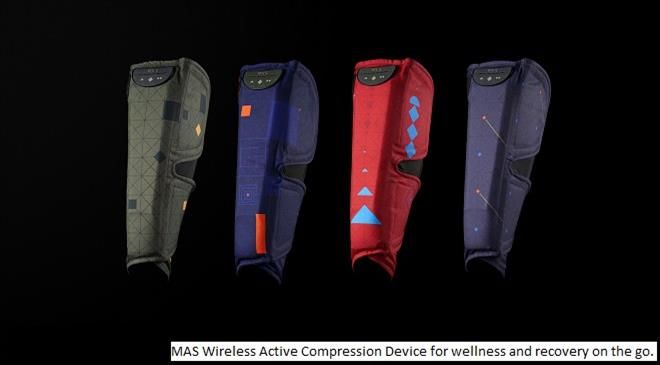Smart clothing is a huge untapped opportunity
Innovation has played an instrumental role in the growth and expansion of MAS Holdings, South Asia’s largest apparel and textile manufacturer. This has provided the company with a strong competitive edge in pioneering next to skin solutions in various product categories, including performance, intimates and athleisure, for over 30 years, for some of the world’s best-known fashion brands.
MAS’ dedicated innovation arm, Twinery, seeks to introduce the next generation of apparel innovations and incubate start-ups that could potentially change the trajectory of the fashion and apparel sector. Reflecting the success of these initiatives, MAS Holdings was recently recognised among the top innovators in the region across all industries. The company was selected for the second consecutive year as the winner of the prestigious Clarivate South and Southeast Asia Innovation Award 2021 in the ‘Corporations’ category.
In this interview, Gihan Philip, Director – Technology Commercialization at Twinery, speaks to Fibre2Fashion about the company’s ongoing projects that seek to change the future of apparel, sustainability, smart clothing, research and more.
How is Twinery supporting the growth of MAS Holdings as its innovation arm?
Innovation is in the DNA of MAS; it is the common thread that connects the entire organisation. At Twinery, our purpose is to be the changemakers, unlocking the business opportunities of tomorrow. We are responsible for delivering innovative products, technology and business model solutions for MAS. The responsibility of building future adjacencies also lies with us. To do this, we have a 100+ strong team from multiple disciplines, a robust process and a start-up culture within Twinery—a winning formula.
Is the US the only market of Thinx at the moment? Do you have plans to launch Thinx in India anytime in future?
Thinx, a reusable period underwear, although based in the US, caters to consumers all across the globe. This includes Canada, the EU, Australia and several countries in Asia.
Has there been any impact due to the pandemic on the research work of Twinery, if any? And if yes, what steps were taken to mitigate these challenges?
Although our teams are based in Sri Lanka, our project ecosystem is spread worldwide. This has prepared us to efficiently work across cross country teams virtually. In this regard, the pandemic did not affect us. However, our research also involved us visiting events around the world and interacting with tech partners, consumers and customers, which was obstructed by the pandemic.
We were fortunate that our teams were very agile. They were quick to adapt to the changing circumstance with minimal delays.
All our innovations are consumer-centric. The change in our consumers’ behaviour, preferences and buying patterns had a significant impact on our brands. Fortunately, through Twinery, we were already working on solutions that addressed some of these shifts. The pandemic merely accelerated the inevitable, and we were prepared to address these needs. To do so, it was essential to reprioritise some of our focus areas and reallocate resources accordingly. Moreover, having a world-class group of professionals with diverse expertise meant that our teams could move across projects seamlessly during this period.
What are the strategic differentiators between you and other tech companies?
One key differentiator is our culture and ecosystem. Whether your role is in Business, Finance or Tech, you are encouraged to be entrepreneurial and take risks. From the start of their career at Twinery, our teams are encouraged to collaborate with partners across different industries and geographies.
The MAS ecosystem consists of strategic partnerships with academic institutions and organisations such as DuPont, Flex, IMEC and Hoist Centre, digital partners, and investments. These collaborations play a pivotal role in every innovation that we have commercialised. We also learn a lot through our core business, which has extensive capabilities.
What are the landmarks in terms of growth that Twinery has seen over the years?
Since Twinery’s inception, MAS has ventured into unchartered territories and has become an industry leader in these new spaces. We feel this is the most exciting time in the apparel space. We will see a lot more noise in the areas of circularity, inclusivity, and wearables.
Our Soft Matter team was one of the first in the apparel industry to revolutionise wearable technology, making it soft, comfortable and washable with products such as i-thermic, Phoenix and Firefly. With SPRYNG we set new standards for portable and untethered active compression recovery technology that will enhance circulation and improve tired and achy legs has raised over $1 million in crowdfunding campaigns.
We have also made further improvements in terms of sustainable business models. ‘Promptly’, our printing platform, is an example of how we are trying to minimise waste in the clothing production value chain by enabling brands to make only what they need when they need it. This process utilises no water and minimises waste by allowing brands to print only what is required when it is needed. It presently operates out of Mexico in collaboration with one of our brands.

What does it mean for the company to win the Clarivate award for the second consecutive time?
The vast improvements that our innovations are making in people’s lives and the value that they are adding to our clients are perhaps the best endorsements of our work. However, independent endorsements such as this award are particularly useful since it benchmarks our performance against other companies, including those beyond the apparel sector.
Hence, being the only apparel company in the world and Sri Lanka’s first to be recognised by Clarivate is a major milestone in Twinery’s journey. To be selected through criteria that identifies the annual top 100 global innovators signifies that MAS is not only an apparel manufacturer but is genuinely a tech solutions provider. It also means that MAS is making a pioneering contribution in supporting Sri Lanka’s transition to a knowledge-based economy.
It was a collective effort from our colleagues—past and present—who think differently, who were brave enough to take risks, were not afraid to fail, and when they did, learnt from it and used those learnings to succeed. It also required us to constantly push our boundaries and not become complacent when we succeeded. It also meant that we developed a culture that equally accepted wins and failures. Being entrepreneurial and doing something first in the world is rewarding, but it’s also challenging as innovation is not a linear process; it’s iterative.
What is the latest in product development, and where is the ball already rolling?
One big shift we are seeing is an accelerated interest in sustainability both by the consumers and the brands wanting to make an honest effort in this space. Apparel is traditionally not been seen as an industry with strong environmental credentials. We see consumers relating more to brands that address environmental and sustainability issues.
The challenge initially was to make our product more sustainable while maintaining consistency in the levels of product quality, performance and functionality. Our teams have been consistently solving these challenges. The developments in this space are happening in areas such as sustainable raw materials like bio-based raw material, recycled and bio-degradable material. With a goal of generating 50 per cent of our revenue through sustainable products by 2025, sustainability is a priority for Twinery. There are also several initiatives around circularity.
What are Twinery’s proprietary technologies, and how would they benefit the consumer?
With 170 patent applications under our belt since our inception in 2017, we have a lot cooking. We intend to make a transformative change in terms of substantial improvements in people’s lives through these innovations.
For instance, our FemTech team has developed proprietary tech solutions for pain points women face at different stages of their lives, including periods, urinary incontinence, pregnancy, and menopause.
We have Intellectual Property (IP) in the area of active circulation. The teams focusing on circulation/ recovery have begun to solve for pain points of Lymphedema patients. They are now enhancing the quality of life of the patients through at-home solutions. Interestingly, the team has also been able to take the concept of enhanced circulation across to consumers who want better circulation due to their hectic sedentary lifestyles.
We also have proprietary technology in colouration, functionalisation of materials, and engineered knits. All these focus on making fashion more sustainable through means such as reducing wastage and energy consumption and improving circularity.
There is a lot of noise around smart textiles. Do you think the adoption of smart textiles has risen compared to earlier times? If not, what are the main hurdles faced?
Lifestyle trends are contributing to the growth of smart clothing. We feel that the demand for smart clothing will continue to increase. Clothing is on us 24 hours a day. It’s a huge untapped opportunity. We believe that the clothing on our bodies can be more adaptive and give us more insights.
It has been a hit and a miss in the past due to high cost, low durability/product life and bulky/obtrusive hardware hampering user experience. Over the years, our teams have solved a lot of these challenges. The hardware and electronics components are also catching up.
What is next in the pipeline for Twinery in terms of future developments?
You will see Twinery focusing on the circularity space that covers both product and business model innovations in the near future. We will also focus on business model innovations that concentrate on nearshoring and customisation as the consumer interest grows in this space. Another area of interest is the Metaverse and how Twinery and our initiatives can be positioned to align with this shift.


